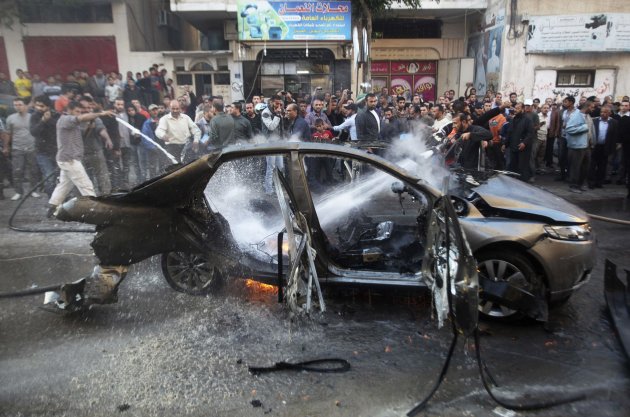An Israeli official said on November 14, 2012, the assassination of Hamas's top commander in the Gaza Strip was not the end of Israel's assault on the coastal territory and more strikes would follow. Ahmed Al-Jaabari, Hamas's military chief, was killed when his car was hit by an Israeli airstrike. Multiple other Israeli attacks rocked the Gaza Strip.[Source]
November 14, 2012
The attacks marked the biggest escalation between Israel and Gaza militants since a 2008-2009 conflict and came despite signs on Tuesday that neighboring Egypt had managed to broker a truce in the enclave after a five day surge of violence.
Hamas said Ahmed Al-Jaabari, who ran the organization's armed wing, Izz el-Deen Al-Qassam, died along with an unnamed associate when their car was blown apart by an Israeli missile. Palestinians said nine people were killed, including a seven-year-old girl.
Video from Gaza showed the charred and mangled wreckage of a car belching flames, as emergency crews picked up what appeared to be body parts.
Israel confirmed it had carried out the attack on Jaabari and warned that more strikes would follow. Reuters witnesses reported numerous explosions around Gaza, with Hamas security compounds and police stations among the targets.
"This is an operation against terror targets of different organizations in Gaza," military spokesman Avital Leibovitch told reporters, adding that Jaabari had "a lot of blood on his hands".Immediate calls for revenge were broadcast over Hamas radio.
"The occupation has opened the doors of hell," Hamas's armed wing said. Smaller groups also vowed to strike back.
"Israel has declared war on Gaza and they will bear the responsibility for the consequences," Islamic Jihad said.The escalation in Gaza came in a week when Israel pounded Syrian artillery positions it said had fired into the Israeli-annexed Golan Heights amid a civil war in Syria that has brought renewed instability to neighboring Lebanon.
Hamas has been supported by both Syria and Iran, which Israel regards as a rising threat to its own existence due to its nuclear program.
Israel's intelligence agency Shin Bet said Jaabari was responsible for Hamas' takeover of the Gaza Strip in 2007, when the militant Islamist group ousted fighters of the Fatah movement of its great rival, the Western-backed Palestinian president Mahmoud Abbas.
It said Jaabari instigated the attack that led to the capture of Israeli corporal Gilad Shalit in a kidnap raid from Gaza in 2006. Jaabari was also the man who handed Shalit over to Israel in a prisoner exchange five years after his capture.
Israel holds a general election on January 22 and conservative Prime Minister Benjamin Netanyahu has come under pressure to respond firmly against Hamas, with residents of southern Israel complaining bitterly about repeated missile strikes
Hamas has been emboldened by the rise to power in neighboring Egypt of its spiritual mentors in the Muslim Brotherhood whom it views as a "safety net".
Related:
- Gaza militants signal truce with Israel after rockets (November 12, 2012)
- Israel Warns of Repercussions for Gaza Rocket Attacks (November 13, 2012)
- Israeli defense minister: 'Almost all' Syrian border villages near Israel controlled by rebels (November 14, 2012)
- Egypt condemns Israel attacks on Gaza, demands halt (November 14, 2012)



